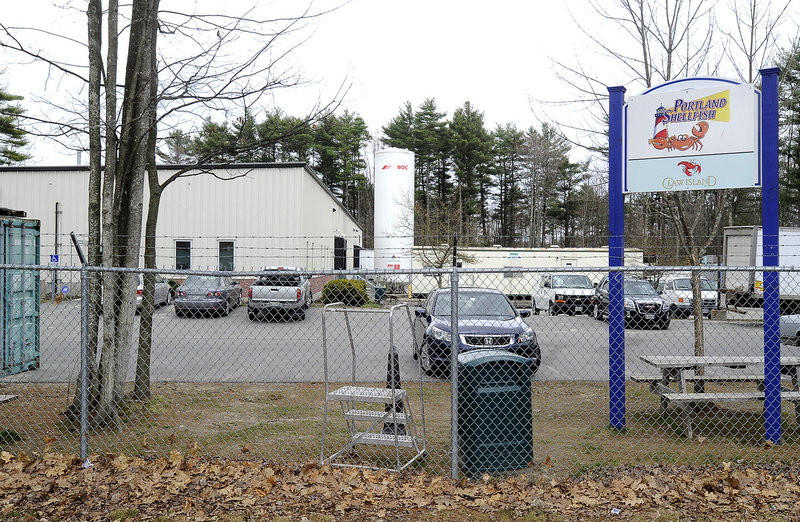PORTLAND — For the second time in a little more than a year, federal regulators have shut down Portland Shellfish Co., citing “numerous violations” of federal laws and health regulations and its agreement to fix food safety problems identified in early 2011.
The Food and Drug Administration also has ordered Portland Shellfish, which processes lobster and shrimp at its plant off Riverside Street, to recall and destroy seafood that the company’s president said is worth about $25,000.
According to a letter to the company from FDA officials, Portland Shellfish won’t be allowed to reopen until it updates its plans and procedures for making sure the seafood it processes is safe.
The FDA’s letter, dated Monday and obtained by The Portland Press Herald, said a conveyor belt used in shrimp processing at the plant tested positive in February for listeria, a bacteria that can cause serious and sometimes fatal infections.
The FDA said the company processed lobster in the same room during the period just before the positive test, and said that lobster must be recalled and destroyed.
Jeffrey Holden, president Portland Shellfish, said Tuesday that the lobster was processed on equipment that is about 70 feet from the contaminated conveyor belt. He said none of the lobster tested positive for listeria, and it is either stored in the company’s warehouses or will be shipped back from customers.
The company cooks raw shrimp and lobster, then freezes it, selling it to wholesalers along the East Coast, Holden said.
He said he doesn’t think that any of the seafood in question has gone beyond his wholesale customers.
The FDA shut down Portland Shellfish for several weeks in January 2011, citing unsanitary conditions including listeria contamination. Portland Shellfish has had to recall contaminated lobster meat four times since 2008, and the FDA says it has recorded food safety violations by the company for more than a decade.
After last year’s shutdown, the FDA put together a consent decree, requiring Portland Shellfish to revamp its operations and make detailed plans for maintaining sanitation.
The agency said it relied on the company’s written plans as it allowed Portland Shellfish to continue operating during the first half of last year. The FDA inspected the plant again in July, September and October.
Inspectors found violations, the letter said, and in September and October the FDA ordered the company to correct the problems. It also ordered company officials to show up for a “regulatory meeting” in January that lasted more than two hours.
After that, the FDA said, the test in February revealed the listeria contamination and the FDA rejected a handful of updates to food safety plans submitted by Portland Shellfish.
Holden said Portland Shellfish is in the middle of a normal shutdown between the shrimp season, which ended in February, and the lobster season, which won’t begin until late spring. He said the company will continue to address problems identified by the FDA in the next couple of months and hopes to reopen the plant in June.
“We’ve got to work hard to get all the plans and procedures to where they want them, and we’re very concerned that we get everything done and done correctly,” he said.
Holden complained that the consent decree requires his company to take steps that other companies don’t have to take.
“What we are required to do is ten times more than what anyone else is being asked to do,” he said. “Our procedures have to be more detailed and stricter than anyone else’s.”
If another company fails an inspection, Holden said, it “doesn’t have the same gravity” as when Portland Shellfish does.
The FDA compliance officer for the case, Karen Archdeacon, would not comment on Tuesday.
Holden said his company will process about 4 million pounds of lobster and shrimp this year. As recently as a couple of years ago, it processed 13 million pounds of seafood annually, he said.
Portland Shellfish closed its crab processing plant in South Portland last year, and with a shortened shrimp season this year, the company is processing much less shrimp.
Holden said the company spends “a lot of money on compliance issues” and has employees with advanced degrees in food science, along with outside consultants, to make sure it’s following regulations.
“It’s a pretty complicated set of regulations” that the company has to comply with, Holden said.
Staff Writer Edward D. Murphy can be contacted at 791-6465 or at: emurphy@pressherald.com
Send questions/comments to the editors.




Comments are no longer available on this story